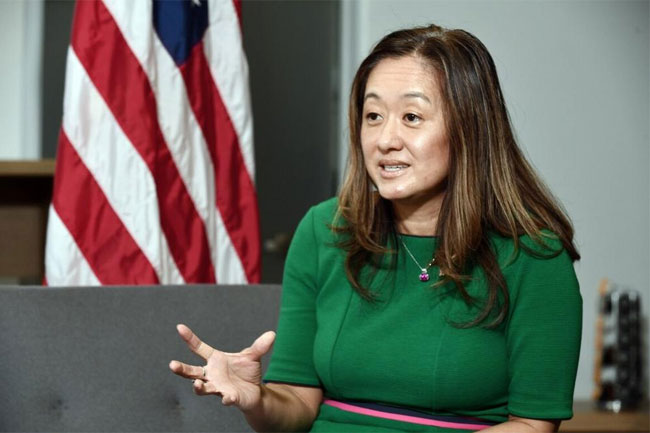Ambassador of the United States to Sri Lanka, Julie Chung says Sri Lanka needs to improve its business environment and investment framework environment in order to tap into foreign direct investment.
Addressing the 2022 Annual General Meeting of the American Chamber of Commerce. The event was attended also by Governor of Central Bank, Dr. Nandalal Weerasinghe.
“It is important to reduce red tape and make sure that there are no unreasonable obstacles to investors as they look for opportunities in Sri Lanka and bring in the foreign capital that the country desperately needs.”
She noted that concerns about consistency and transparency in government decision-making, and above all, a lack of predictability, are the primary reasons American firms give as to why foreign direct investment has not grown faster.
“What our companies want is a level playing field, a good regulatory framework, and trust that their arbitration and their contracts will be honored. When you have that kind of strong investment climate, then companies will want to come.”
With regard to the staff-level agreement reached by Sri Lanka and the International Monetary Fund (IMF), US ambassador said the USD 2.9 billion program, if approved by the IMF board, would help restore macroeconomic stability, safeguard financial stability, protect the vulnerable, implement structural reforms, and most importantly address corruption, all to encourage Sri Lanka’s economy to growth at its full potential.
“While we are all celebrating this very important milestone, now is not the time to become complacent. Much more hard work lies ahead. Now more than ever, the private sector can make a difference in creating a more inclusive and sustainable economy.”
Speaking on President Ranil Wickremesinghe’s pledge to establish a “State-Owned Enterprise Restructuring Unit” to recommend how to reform Sri Lanka’s loss-making government-run companies, the US ambassador said the work on these critical reforms must start immediately and the results need to address the root causes of this crisis so that the country finally enshrines international standards of good governance and transparency for the benefit of all Sri Lankans.
“Similarly, there should be swift action to establish and convene the Parliamentary Committee on Ways and Means, National Debt Management Agency, National Agency for Public Private Partnership, and the other committees and agencies laid out in the president’s speech. We support these efforts,” she continued.
Before the IMF board approves Sri Lanka’s 17th assistance package, the Sri Lankan government must negotiate with its official creditors to provide adequate financing assurances. The US ambassador said she is encouraged to hear President Wickremesinghe and the Governor of the Central Bank of Sri Lanka talk about the need for equitable and comparable debt treatment. “The United States, through the Paris Club, looks forward to collaborating with Sri Lanka in this effort. The president asked all creditors to “sing from the same hymn sheet.” We call on all parties to come to the negotiating table and join the choir.”
Stating that United States is still Sri Lanka’s largest single country export market and thus a key and unparalleled element to the island nation’s prosperity and that the two countries’ bilateral trade amounts to about three percent of Sri Lanka’s GDP and supports at least 180,000 Sri Lankan jobs, the US ambassador noted that Sri Lanka, with the help of American Chamber of Commerce, can expand on the economic relationship between the United States and Sri Lanka and grow its exports and investments in the United States.
“This is a defining moment in Sri Lankan history, and a time when we all must come together: government, private sector, civil society, and the international community. We must do whatever each of us can constructively do to solve the problems of the day,” she added.
The US envoy reiterated that the United States continues to stand by Sri Lanka during these challenging times.


